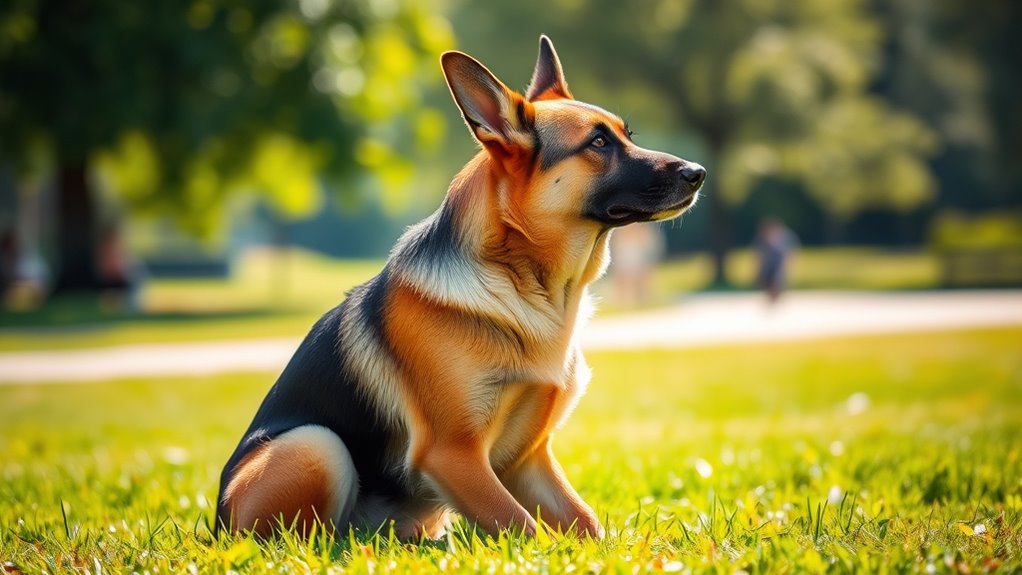German Shepherds are incredibly intelligent and loyal dogs that thrive with consistent, positive reinforcement training. They respond well to clear commands and build strong bonds through shared routines and experiences. Their loyalty grows through daily interactions, making them dependable protectors and companions. By understanding their needs and fostering trust, you’ll strengthen your connection. If you keep exploring, you’ll discover more ways to enhance your relationship with your German Shepherd and unleash their full potential.
Key Takeaways
- German Shepherds are highly intelligent, excelling in training, problem-solving, and adaptability through positive reinforcement methods.
- Their loyalty develops through consistent routines, shared experiences, and positive interactions, fostering strong bonds with owners.
- Clear commands and routine reinforcement reinforce trust and loyalty, making them responsive and eager to please.
- Engaging training activities like obedience and agility strengthen the owner-dog bond and promote mutual trust and loyalty.
- Understanding cultural perspectives on loyalty enhances training approaches and deepens the connection between owner and German Shepherd.

German Shepherds are renowned for their exceptional intelligence and unwavering loyalty, making them one of the most versatile and dependable dog breeds. When it comes to nurturing their qualities, understanding effective training methods is key. These dogs thrive on consistent, positive reinforcement techniques that stimulate their sharp minds and encourage good behavior. You should focus on clear commands, patience, and rewarding progress to keep them engaged and enthusiastic to learn. Using reward-based training methods not only accelerates their learning curve but also strengthens the bond you share. As they quickly grasp commands, your consistent approach helps them see you as a reliable source of guidance, fostering trust and respect.
Loyalty development plays a vital role in shaping a German Shepherd’s character. You might notice that they form strong attachments to their owners, but this loyalty doesn’t develop overnight. It’s built through everyday interactions, training sessions, and shared experiences. Spend quality time with your dog, establishing routines that reinforce your role as their protector and leader. This consistency reassures them and deepens their trust, making them more responsive and motivated to please. Incorporate activities that encourage teamwork, like obedience exercises or agility training, to promote a sense of unity. When your dog perceives you as a steady, caring figure, their loyalty naturally grows stronger. Additionally, understanding the cultural significance of loyalty in different regions can help you better appreciate your dog’s dedication to you.
Frequently Asked Questions
How Do German Shepherds Compare to Other Dog Breeds in Intelligence?
You’ll find that German Shepherds rank very high in breed comparison for intelligence, often near the top in intelligence ranking. They’re quick learners, enthusiastic to please, and excel at training and problem-solving. Compared to other breeds, they stand out for their adaptability and work ethic. If you want a dog that’s smart and loyal, a German Shepherd is an excellent choice, surpassing many other breeds in these qualities.
What Training Methods Best Enhance German Shepherd Loyalty?
Picture a loyal guardian standing tall, unwavering in your corner. To enhance your German Shepherd’s loyalty, use positive reinforcement—praise, treats, and encouragement—to build trust. Maintain consistent routines, so your dog knows what to expect and feels secure. These methods create a bond as strong as steel, making your German Shepherd enthusiastic to please and deeply loyal. Your steady guidance transforms obedience into heartfelt devotion.
Are German Shepherds Suitable for First-Time Dog Owners?
Yes, German Shepherds can be suitable for first-time dog owners if you’re prepared to invest time in their training. Focus on establishing puppy independence early, which helps manage their confidence. Use consistent leash training techniques to build trust and obedience. Be patient and positive, reinforcing good behavior. With proper guidance, you’ll develop a strong bond, and your German Shepherd will thrive as a loyal, well-behaved companion.
How Does Socialization Impact a German Shepherd’s Intelligence?
Socialization benefits your German Shepherd’s intelligence development by exposing it to diverse experiences, people, and environments. When you socialize your dog early and consistently, you help strengthen its problem-solving skills and adaptability. This mental stimulation keeps your dog engaged and sharp, making it easier to train and manage. So, by prioritizing socialization, you boost your German Shepherd’s cognitive abilities and foster a well-rounded, confident companion.
What Are Common Behavioral Issues Related to Loyalty in German Shepherds?
You might notice your German Shepherd becoming overly possessive or experiencing separation anxiety, which are common behavioral issues linked to loyalty. These behaviors stem from their strong bond and desire to protect their family. When you leave, they may become anxious or clingy, and they might guard possessions fiercely. To address this, provide consistent training, socialization, and positive reinforcement, helping them build confidence and trust without becoming overly possessive.
Conclusion
You can see that German Shepherds are truly a cut above when it comes to intelligence and loyalty. Their sharp minds and unwavering devotion make them exceptional companions and protectors. With such qualities, they’re a breed that proves actions speak louder than words. If you’re lucky enough to have one, you’ll find that they’re worth their weight in gold—trust me, they’ll be your steadfast partner through thick and thin.










